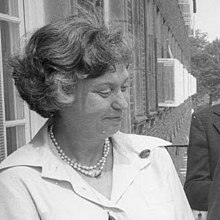Carla Henius
Carla Henius | |
|---|---|
 Carla Henius in 1976 | |
| Born | 4 May 1919 Mannheim, Germany |
| Died | 27 December 2002 (aged 83) Murnau am Staffelsee, Germany |
| Education | Musikhochschule Berlin |
| Occupations |
|
| Organizations |
|
| Awards | Federal Cross of Merit |
Carla Henius (4 May 1919 – 27 December 2002) was a German operatic soprano and mezzo-soprano, voice teacher and librettist. She played a decisive role in promoting recent works by composers such as Arnold Schoenberg, Karlheinz Stockhausen and Luigi Nono for the stage. She wrote the libretto for an opera by Aribert Reimann.
Career
Born in
She was a lecturer at the
Henius was married to the intendant of the Opernhaus Kiel, Joachim Klaiber.[1] He proposed from 1963, first with Peter Ronnefeld, then with Hans Zender, to devote a third of the program to contemporary opera. Henius was called 1977 to the Musiktheater im Revier in Gelsenkirchen by the new Intendant, Claus Leininger to form and direct a musik-theater-werkstatt (Music Theatre Workshop). When Leininger moved to the Hessisches Staatstheater Wiesbaden, she followed and directed a similar institution for new operas there.[2]
She died in Murnau am Staffelsee.[1]
Awards
In 1987, she was awarded the
Work
- Ein Traumspiel (1964). Opera libretto after Strindberg's A Dream Play, translated by Peter Weiss. Music: Aribert Reimann. Premiere 20 June 1965 at the Opernhaus Kiel.[6]
Literature
- ISBN 3-434-50071-5
References
- ^ ISBN 978-3-59-844088-5.
- ^ a b Henius, Carla (3 July 1987). "Die tägliche Dreckarbeit". Die Zeit (in German). Retrieved 26 June 2018.
- ISBN 978-3-20-579628-2.
- ^ Recordings with Carla Henius, muziekweb.nl
- ^ "Carla Henius" (in German). Wiesbaden. Retrieved 26 June 2018.
- ^ "Ein Traumspiel". Schott. Retrieved 26 June 2018.
